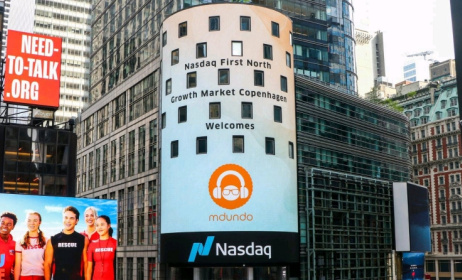TuneCore’s Chioma Onuchukwu talks about pros and cons of African music industry
Africa is now very much part of the ongoing global digital music revolution. Its booming music industry in recent years has resulted in the arrival of major international players on the continent. At the same time, the music scene here is largely driven by independent artists harnessing the latest digital tools to grow online communities and court a listenership that transcends borders. This is despite the perpetual challenge of music piracy, high data cost and low internet penetration.
 TuneCore head for East and West Africa Chioma Onuchukwu.
TuneCore head for East and West Africa Chioma Onuchukwu.
According to a 2022 report by the International Federation of the Phonographic Industry’, streaming in sub-Saharan African grew 9.6% last year. Africa is projected to generate about $500m in streaming revenue by 2025, with Afrobeats hub Nigeria as the torchbearer.
Believe-owned global digital music distributor TuneCore says its vision for the African music sector is to enable independent artists to reach global audiences. The company, which distributes to more than 150 stores worldwide, is also focused on facilitating opportunities for the careers of independent artists. Its latest move in this regard includes recently announced annual flat fee plans.
“We want more independent African artists to gain success as independent artists, whether they choose to be independent or not in the long run,” the company’s head for East and West Africa, Chioma Onuchukwu, told Music In Africa.
In the below interview, Onuchukwu, who has been confirmed as a speaker at Music In Africa’s ACCES music conference in Dar es Salaam, Tanzania, this November, discusses TuneCore’s role in driving the global acceptance of African music and the areas that need urgent fixing in the local music sector.
MUSIC IN AFRICA: In what way is the African music sector different to the business elsewhere?
CHIOMA ONUCHUKWU: For one, the music infrastructure is still growing as compared to developed markets. Music streaming is picking up slowly in Africa but isn’t at its full potential yet. There’s still the issue of unstable internet and its high cost. Operating in this market requires a lot of consideration and adjustment to service this market. That being said, our local talent and international traction are growing exponentially, making this market very attractive.
What are some of the factors driving the global acceptance of African music in recent years, and what has been TuneCore’s role in this?
One factor driving global acceptance of African music is the availability of good African music. The music can’t be accepted or loved if it is not accessible. If audiences can’t go through a playlist, search or discover your music via social platforms like YouTube, TikTok or Instagram, it won’t go global.
In 2020, TuneCore launched a global promotion that lets musicians upload their music to TikTok for free. What would you say is the place of TikTok in the music ecosystem, and what is the value of partnerships like this?
As part of our new price plans, artists now have the option to only distribute their music to social platforms like YouTube and TikTok with no charge but a small commission. We’ve found that social platforms like TikTok are a great means for the discovery of artists, especially through viral content. It’s a great way to be exposed to global audiences and something every artist should prioritise. We always want to create opportunities for our artists, so why not make getting your music on these discovery platforms and future ones easy?
What are your observations about music distribution strategies, particularly in East and West Africa, and what impact do you expect TuneCore to make in the sub-region in the next few years?
Many African artists have no clue about how to distribute their music and how simple and possible it is. Many only focus on the creation part. Some want a team but can’t afford it. Then there are others who only focus on distribution with no marketing, or focus on marketing with no distribution.
Part of our goals for the market is to educate and inform African artists through boot camps, masterclasses and other speaking opportunities on the how-to and importance of treating their music as a business. We want artists to be successful and we do our best to close the possible gaps. We recently launched our new unlimited price plan, which will be beneficial for a price-sensitive market like Africa.
What transformations in the music scene here have impressed you most and how effective are entertainment companies in leveraging opportunities for the African music industry?
The streaming business is starting to grow, although slowly. South Africa is leading in terms of streaming revenue and Nigeria is gradually growing. More international digital service providers like Spotify now have operations in Africa. Of course, part of this transformation is the amazing music created by Africans. We are gaining international traction and winning international awards now.
To many, high data costs and a lack of mobile penetration are hampering Africa’s streaming industry from reaching its full potential. Still, what is your assessment of it as a medium for consumption, and in what way can artists truly harness digital tools and the streaming space to sustain themselves?
Since the pandemic, mobile and internet penetration increased significantly. What we’ve seen is Africans having more than one mobile device with more than one network or internet provider in order to keep businesses running and to stay connected on social media. For artists, it’s important to look beyond Africa and think global. We’ve seen African musicians gain popularity from global audiences just by having their music distributed worldwide. It’s happened a lot. That should be a goal. To do this, we should distribute your music and promote it.
What areas need urgent attention in Africa’s music sector?
There’s a problem of music piracy on the continent, and we’ve found that artists actually patronise these sites in the hope of gaining popularity and promoting their music, which never happens for them: they don’t gain popularity and they don’t make money. It’s important to provide education and information for areas like digital music distribution as well as treating their music as a business. The culture of music streaming, although improving and growing, has not fully taken off due to Africa being a price-sensitive market with unstable and high internet prices.


![‘Shake It To The Max (FLY) [Remix]’, a song by Ghanaian artist Moliy (pictured), is among the three tracks that claimed the number one spot on the Shazam Global chart.](https://www.musicinafrica.net/sites/default/files/styles/article_mega_menu/public/images/article/202507/moliy.jpg?itok=_lcMI2Xi)




























Comments
Log in or register to post comments